-
Search -
Accessibility -
Members Login





Our work
Realising the full value of our diversity through being inclusive and fostering participation will be essential for ensuring our relevance, legitimacy and impact as well as truly living our values. We will proactively address issues of bias and racism both at the organizational and individual or personal level. We commit to protecting the rights of people and also to promoting best practices for safeguarding, ensuring protection from sexual exploitation and abuse (PSEA) and fulfilling a duty of care.
In our membership:
The ICVA membership seeks to represent the full diversity of NGOs and NGO networks engaged in humanitarian action. Our approach to membership will require us to be creative in exploring effective ways of including both formal and informal groups that are less structured, but still represent important voices that need to be heard. The membership will not expand to include other sectors or non-NGO humanitarian actors as this would risk diluting the identity of ICVA.
In our governance:
ICVA will evolve its governance to do justice to its diversity; not only to include diverse members in the composition of our Board but to also integrate a more structured approach to representing the voices of members in the governance system as a whole. We will consider channels through Board members themselves, through processes leading to decisions and through use of regular member gatherings such as the Annual Conference.
ICVA’s Diversity Policy was approved in 2019. The purpose of this Policy is to reinforce ICVA’s longstanding commitment to diversity, with a specific focus on:
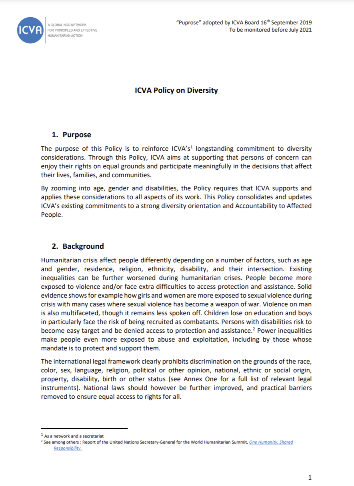
The purpose of this Policy is to reinforce ICVA’s longstanding commitment to diversity considerations. Through this Policy, ICVA aims at supporting that persons of concern can enjoy their rights on equal grounds and participate meaningfully in the decisions that affect their lives, families, and communities.

The purpose of this Policy is to reinforce ICVA’s longstanding commitment to diversity considerations. Through this Policy, ICVA aims at supporting that persons of concern can enjoy their rights on equal grounds and participate meaningfully in the decisions that affect their lives, families, and communities.
ICVA’s 2019 Diversity Policy reinforce ICVA’s longstanding commitment to diversity, with a specific focus on the considerations of Gender. This includes its work on Prevention of Sexual Exploitation and Abuse (PSEA); and protection against violence due to sexual orientation and gender identity.
ICVA will continue and scale up the regional work whereby different actors from the region are brought together for learning opportunities, with thematic sessions on gender equality and gender transformation in related contexts and connecting changes at the implementation level with broader policy-level discussions.
ICVA’s work has so far remained limited to PSEA and participation and contribution to the GenCap. While a lot has been achieved on both subjects and the Secretariat will continue to invest in them, discussions among members and the Secretariat team have concluded not only in identification of the need for better inclusion of gender considerations, but also in a request by members for the Secretariat to do more in this regard.
In 2021 ICVA commissioned Plan International to undertake a scoping study to look at how to improve its inclusion of gender considerations and explore how to operationalise its Diversity Policy, approved in 2019.
The findings seek to answer two central questions:
This scoping study finds that ICVA is currently engaged in a number of workstreams that contribute to or are complementary with the gender equality in humanitarian action agenda, such as the strong work with local women-led organizations, but that more should be done to a) capitalize on the gains and opportunities presented, and b) respond to the requests from ICVA members to support them.
For full details see the scoping study, and the management response.
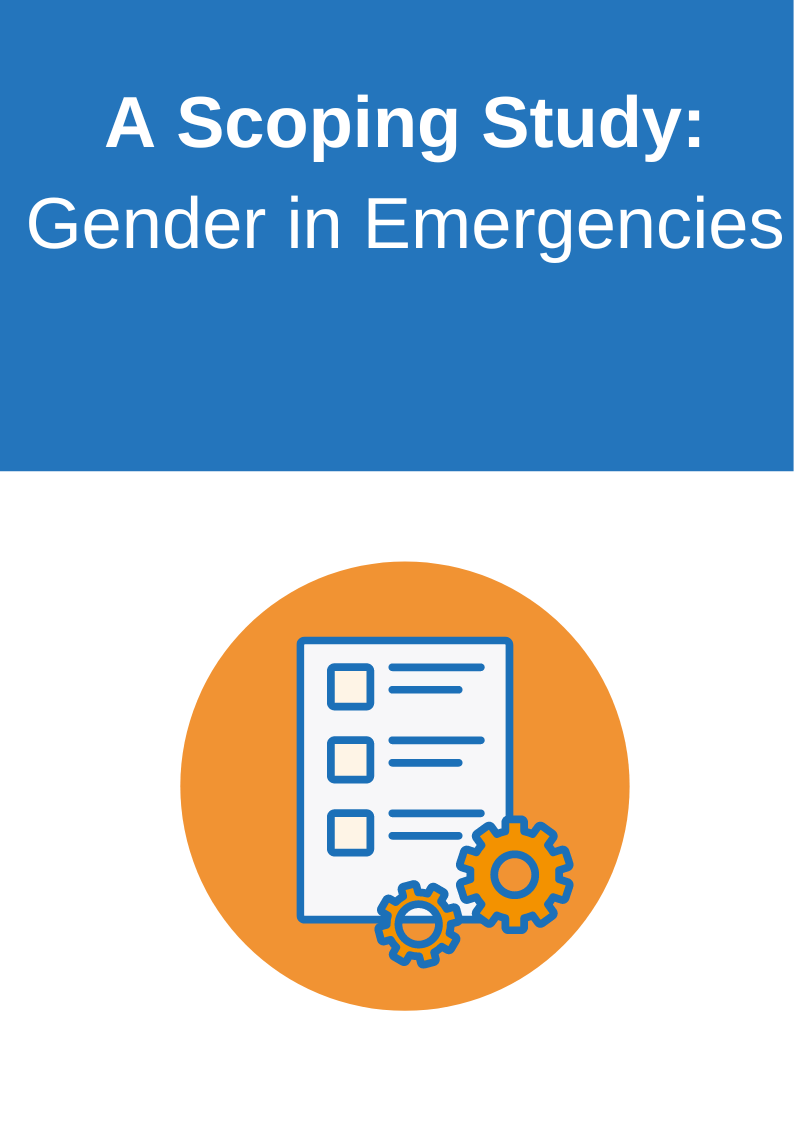
This scoping study was commissioned by ICVA in response to requests from members to improve its inclusion of gender considerations and explore how to operationalise its Diversity Policy, approved in 2019.
ICVA is a Global Partner of the Call to Action on Protection from GBV in Emergencies. In April 2022, ICVA joined the Call to Action on Protection from GBV in Emergencies.
The Call to Action is a global initiative of governments and donors, international organisations (IOs) and non-governmental organisations (NGOs). Its aim is to drive change and foster accountability within the humanitarian sphere so that every humanitarian effort, from the start, includes the policies, systems and mechanisms necessary to provide safe and comprehensive services to those affected by gender-based violence (GBV), to prevent GBV, and mitigate GBV risks, especially violence against women and girls.
As a Call to Action partner, ICVA is committed to ensuring implementation of this initiative’s Road Map and will submit an annual public report on progress in meeting commitments. ICVA’s 3 key commitments are:
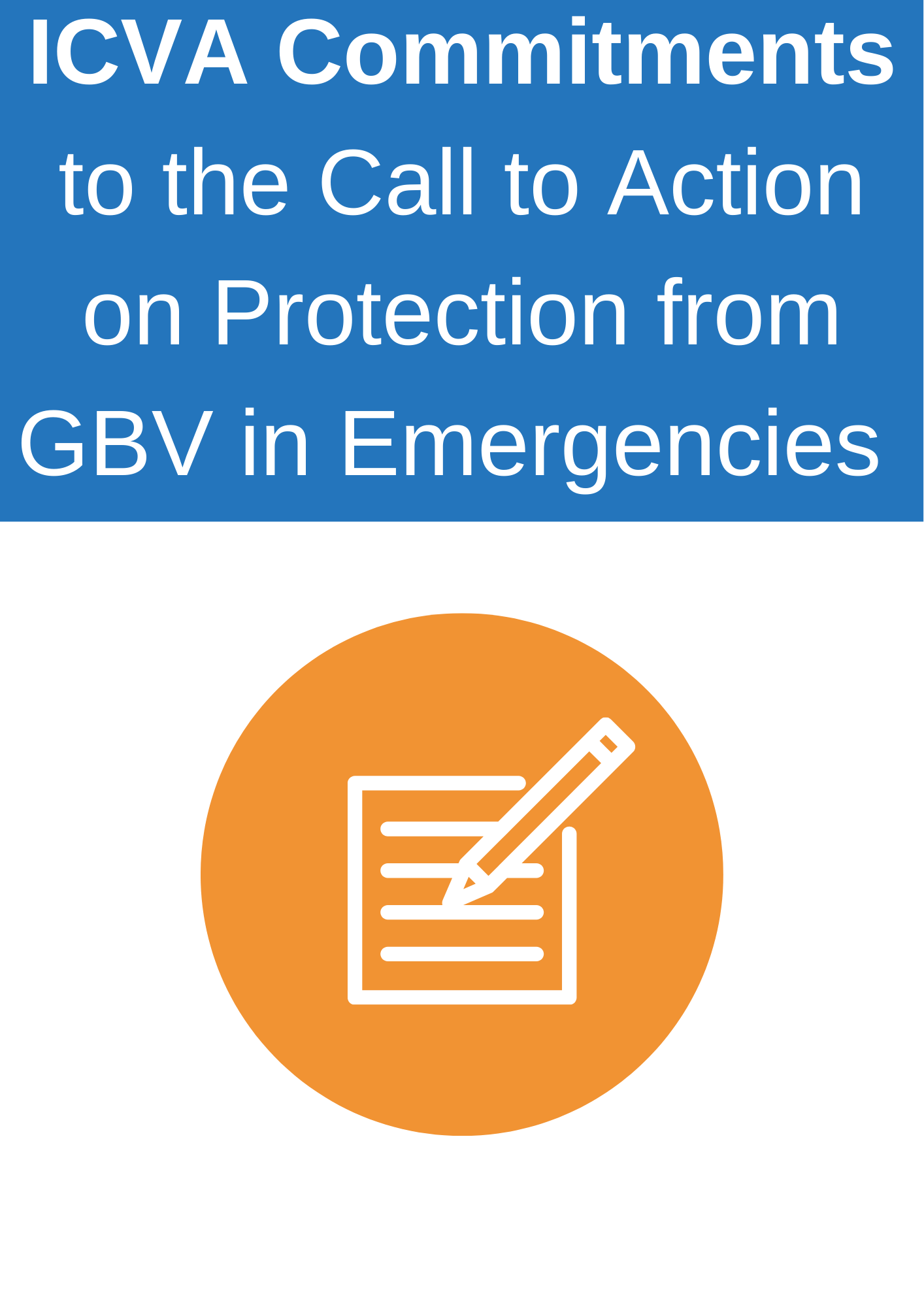
ICVA is a Global Partner of the Call to Action on Protection from GBV in Emergencies and is committed to ensuring implementation of this initiative’s Road Map. ICVA’s 3 key commitments are:
With emergency situations, disasters and conflict increasing worldwide, the suffering and humanitarian needs are driven upwards as well, in particular affecting children. While humanitarian principles require that assistance be delivered impartially to those most in need without discrimination, a “one-size fits-all” emergency response tends to overlook the specific, yet wide-ranging, vulnerabilities of young girls and boys in emergency contexts.
Within ICVA’s diversity work, child rights have become priority streams through joint initiatives and partnerships with members, UN agencies and other networks.
In response to the UN Secretary General’s report ‘Our Common Agenda‘ and advocacy by Child Rights Connect, a Guidance Note was drafted to mainstream the right of the child in all UN pillars of work. An inter-agency process involving civil society and children was initiated to develop the Guidance Note, with a concept note being circulated to outline the process. ICVA urged its members and other stakeholders working for and with children in humanitarian contexts to participate in the development of the Guidance Note through an online survey and regional consultations in North America & Caribbean, Latin America, Europe & Middle East and North Africa, Africa, Asia, and Pacific & Australia regions. The online survey was available in English, French, and Spanish.
Beginning in 2019, ICVA and UNICEF agreed to reach out to the NGO sector to gather their feedback and perceptions of current strengths and challenges in the partnership with UNICEF and to explore pathways to improve such partnership. This resulted in the publication of ICVA’s scoping study on UNICEF-NGOs Partnership in Humanitarian Settings. The acknowledgement of both UNICEF and NGOs that more regular exchanges are needed to enable a partnership fit to respond to the challenges faced by children in today’s humanitarian landscape and the scoping study’s findings, led to the joint organisation by ICVA and UNICEF of the UNICEF-NGO Consultation for Partnership in Humanitarian Settings ‘Enhancing the Culture of Partnership’ in November 2019.
From 17 to 19 November 2020, UNICEF and ICVA hosted the virtual 2020 UNICEF-NGO Partnership in Humanitarian Action Annual Consultation ‘Working Together to Address Emerging Challenges’. It followed up on the commitments endorsed in 2019 and focused on the ongoing efforts to address emerging challenges in 2020, most notably the impacts of COVID-19 on partnerships, decolonialisation of aid, localisation, UNICEF simplified partnership procedures and funding flexibility for NGOs in the context of COVID-19.
In 2020, ICVA, UNICEF, InterAction and SCHR convened a series of NGO briefings on Humanitarian partnerships on COVID-19 response. The briefings aimed at ensuring that the impact of COVID-19 and the response needed are discussed and built upon jointly by UNICEF and NGO partners to ensure a better collaboration on the ground in the collective response for children.
The FAQ, agendas and PowerPoint Presentations and other relevant documents from the UNICEF-NGO consultations and UNICEF-NGO COVID-19 briefings can be accessed in the resources section.
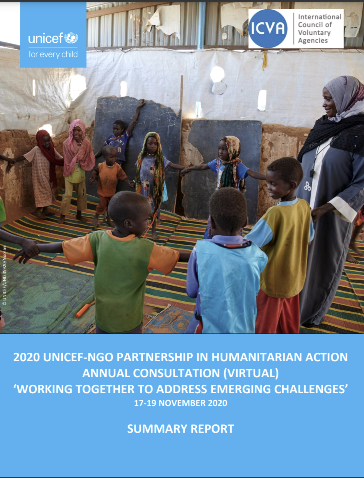
Useful resources from the UNICEF-NGO Partnership in Humanitarian Action 2020 Annual Consultations.
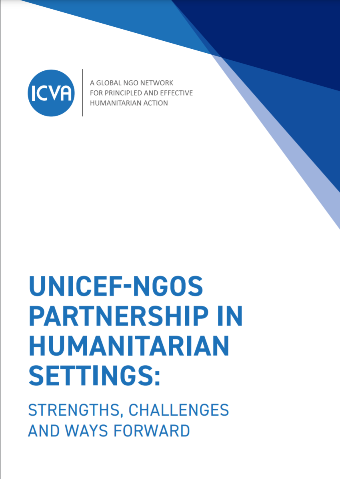
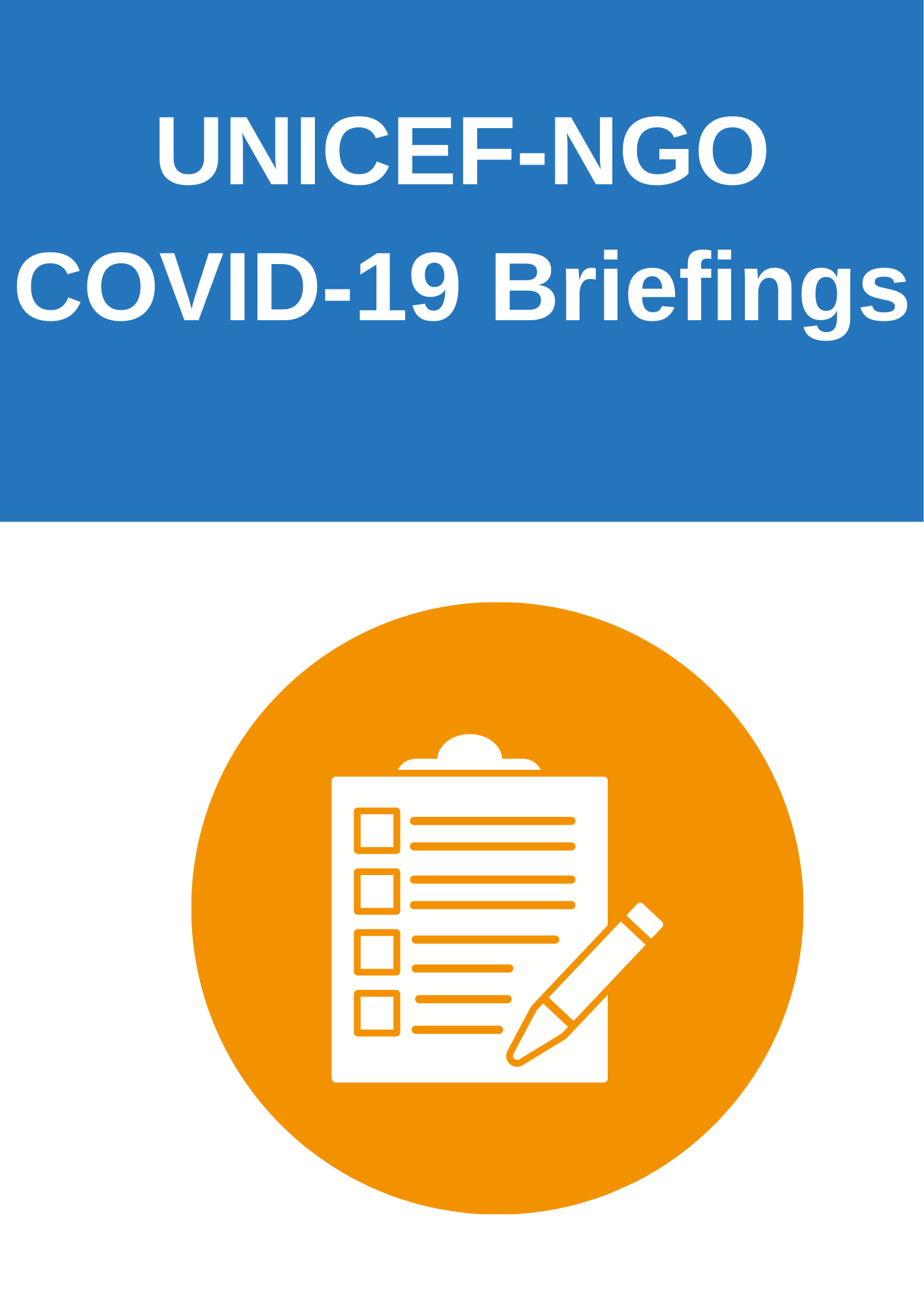
In 2020, UNICEF, in co-organisation with three NGO consortia ICVA, SCHR and InterAction, launched its NGO briefings on Humanitarian partnerships in COVID-19 response.
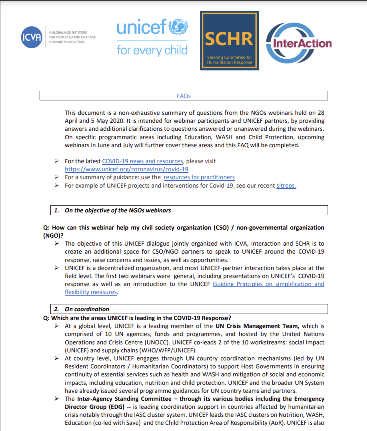
The first two briefings took place on 28 April and 5 May. They covered general aspects of UNICEF’s response as well as operational questions. A summary of questions posed during these briefings can be accessed here:
Persons with disabilities are among the most marginalised people in crisis-affected communities and disproportionately affected by conflict and disasters. Facing substantial barriers to accessing assistance, people with disabilities are often not taken into account in humanitarian response or are considered only as recipients of aid and not as actors in the response.
This situation is however changing as people with disabilities have asked humanitarian actors to better consider their rights in intervention. Today a number of key documents and tools support inclusion of persons with disability in humanitarian programming.
ICVA’s online report examining the implementation of IASC Guidelines on the Inclusion of Persons with Disabilities in Humanitarian Action. The report is based on interviews and consultations with various humanitarian actors, including ICVA members, the Organization of persons with disabilities, NGO Fora and other actors. In addition, the report evaluates supplementary measures taken to promote inclusion and offers valuable recommendations for further action.
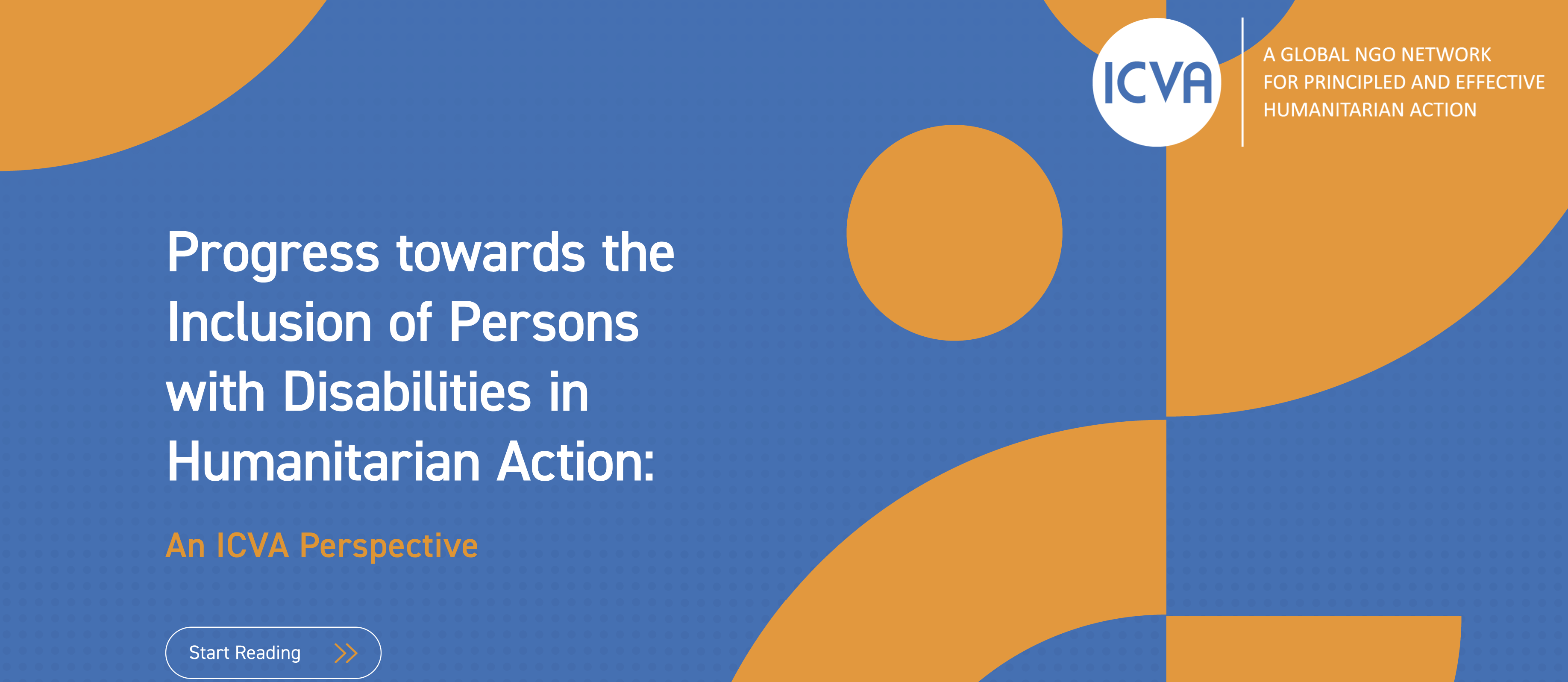
The report examines the implementation of IASC Guidelines on the Inclusion of Persons with Disabilities in Humanitarian Action.
Click on the below link to read the report.
In 2016, the United Nations Inter-Agency Standing Committee (IASC) Working Group agreed on the establishment of a Task Team on the Inclusion of Persons with Disabilities in Humanitarian Action, which, through a large number of consultations with member States, organisations of persons with disabilities and/or in humanitarian action and UN agencies, drafted the Guidelines on Inclusion of Persons with Disabilities in Humanitarian Action. They were endorsed by the IASC Principals in 2019.
Following the launch of the Guidelines, ICVA organised a webinar, entitled, Inclusion of persons with disabilities in humanitarian action: what after the guidelines?, to discuss how the Guidelines should be implemented in practice and what actions are needed to translate them into concrete improvements in the daily activities of humanitarian organisations.
A Reference Group was also established to continue to bring together key stakeholders for the implementation of the IASC Guidelines on Inclusion of Persons with Disabilities. The group provides support, develops supporting tools and resources and assists in dissemination. ICVA joined the Reference Group and is engaging in its working streams.
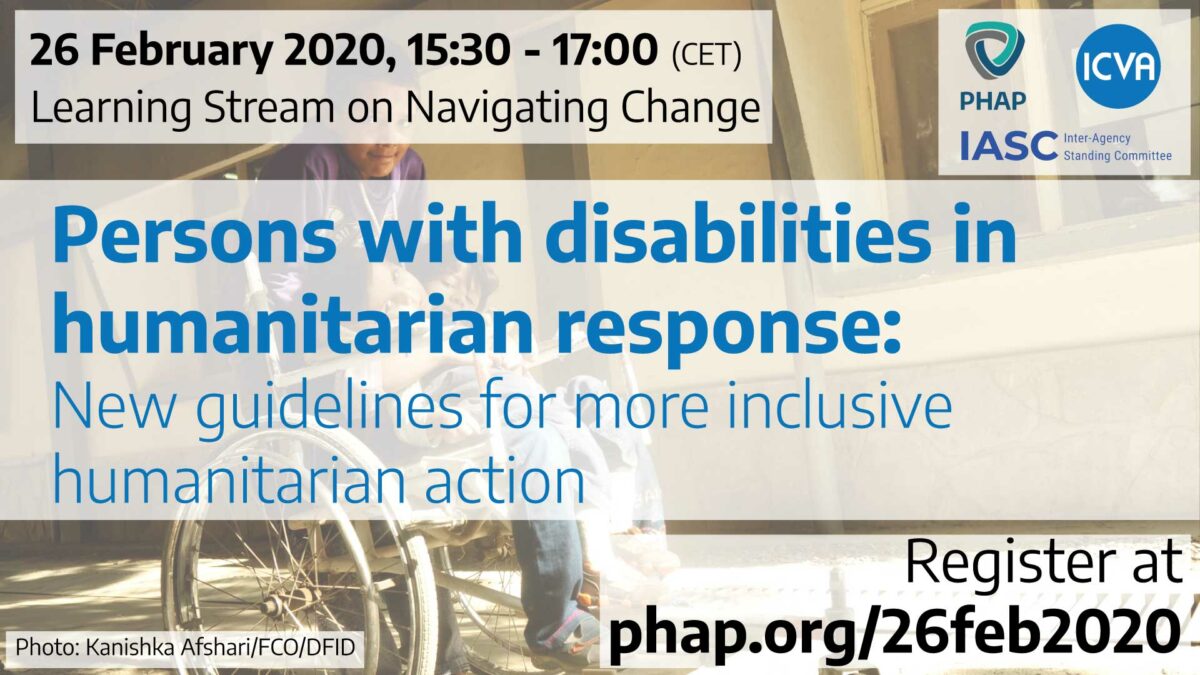
akaakka
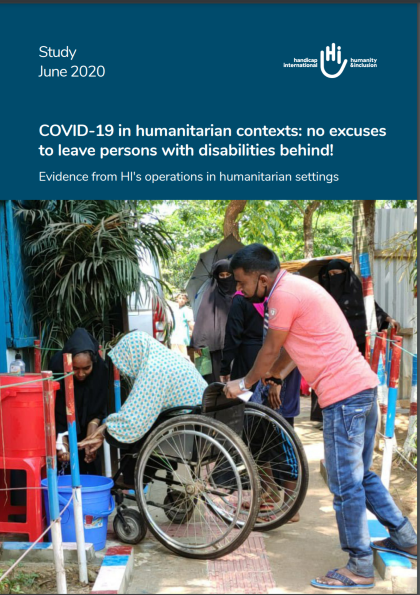
The report aims to illustrate how the COVID-19 crisis triggers disproportionate risks and barriers for men, women, boys and girls with disabilities living in humanitarian settings.
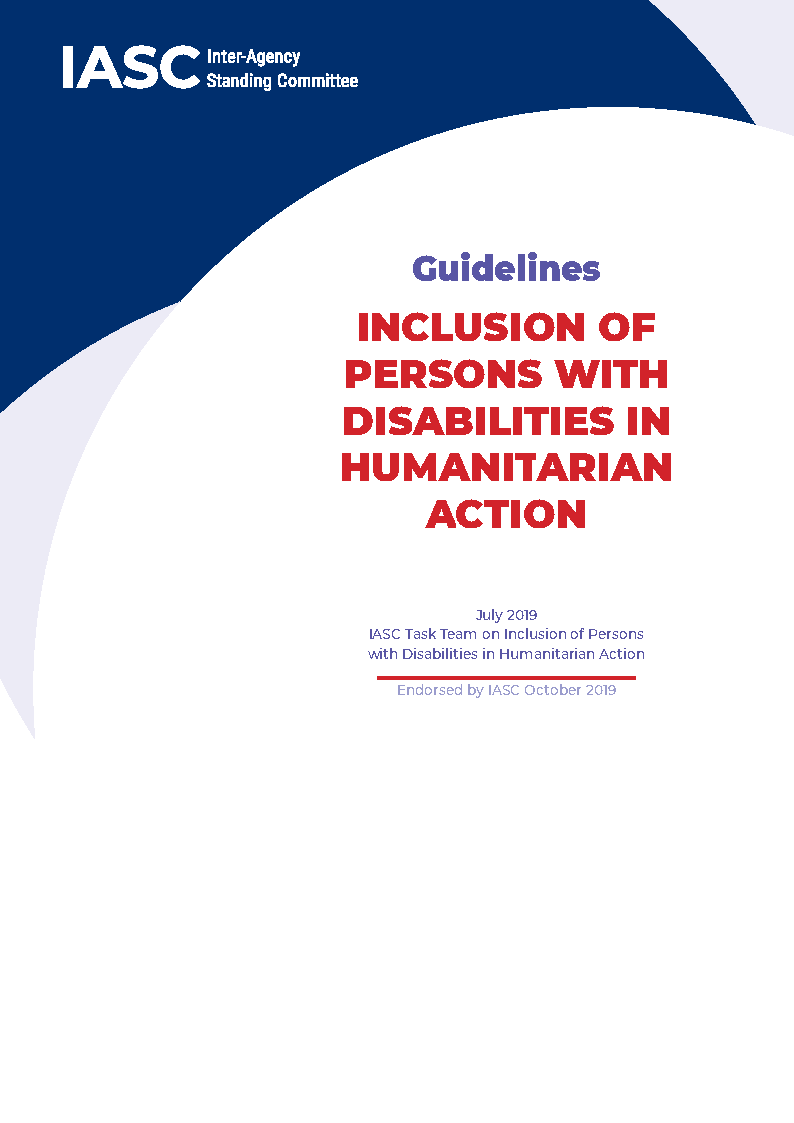
The guidelines set out essential actions that humanitarian actors must take in order to effectively identify and respond to the needs and rights of persons with disabilities who are most at risk of being left behind in humanitarian settings.
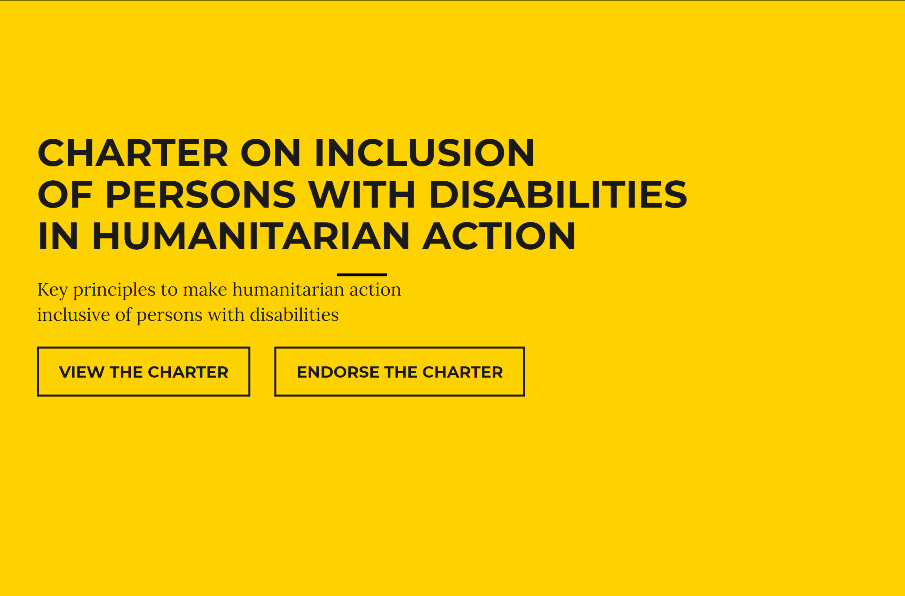
Key principles to make humanitarian action inclusive of persons with disabilities.

ICVA is a global network of non-governmental organisations whose mission is to make humanitarian action more principled and effective by working collectively and independently to influence policy and practice.
International Council of Voluntary Agencies
NGO Humanitarian Hub,
La Voie-Creuse 16, 1202, Geneva, Switzerland
Email: secretariat@icvanetwork.org
A curation of monthly updates, latest news, tools, and events around forced migration, coordination, financing, and cross cutting issues all sent straight to your inbox.